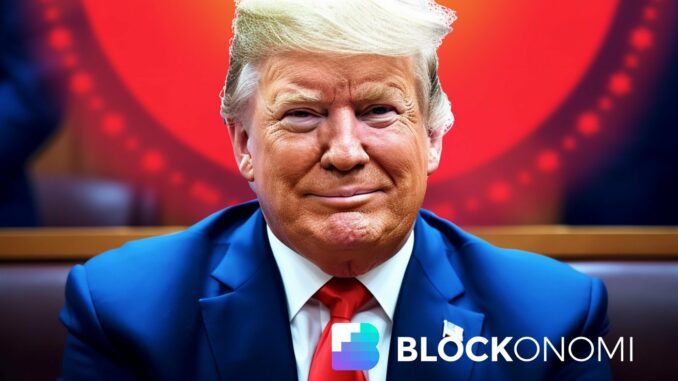
TLDR
Former President Donald Trump reiterated his support for Bitcoin and cryptocurrency during a livestream interview with Adin Ross
Trump urged the US government not to sell its crypto holdings, but instead focus on developing the industry
He compared crypto to artificial intelligence, stating that the US needs to innovate or risk falling behind countries like China
Trump suggested the possibility of using Bitcoin to pay down the US national debt of $35 trillion
In a recent livestream interview with popular streamer Adin Ross, former President Donald Trump reaffirmed his support for Bitcoin and cryptocurrency, urging the United States to take a leading role in digital asset innovation. Trump’s comments come at a time of increased speculation about the US government’s intentions regarding its cryptocurrency holdings.
During the interview, Trump emphasized the importance of the United States maintaining its competitive edge in emerging technologies.
He drew parallels between cryptocurrency and artificial intelligence, stating,
“It’s like AI — ‘do you love it or do you not like it?’ — if we don’t do it, China is going to do it, or other people are going to do it, and we can’t be left behind, and crypto is right in that sphere.”
The former president expressed concern about recent reports of large Bitcoin transfers from wallets identified as belonging to the US government. Last week, a transaction of approximately $2 billion worth of Bitcoin to an unidentified wallet sparked speculation about potential government plans to sell its crypto holdings.
Trump argued against such a move, saying,
“It’s something they shouldn’t be doing because they should be trying to build it. If we don’t do it, China’s doing it, and other places are doing it, and they’re doing it anyway.”
Trump described cryptocurrency as a “very modern currency” and praised the industry, noting, “I know a lot of very good people that are really into that world, and into that market, they’re smart, they’re good people, and they think it’s going to be very beneficial.”
In a separate interview on Fox News, Trump floated the idea of using Bitcoin to address the United States’ national debt, which currently stands at $35 trillion.
He suggested,
“Who knows, maybe we’ll pay off our $35 trillion dollar [national debt], hand them a little crypto check, right? We’ll hand them a little Bitcoin and wipe away our $35 trillion.”
While the practicality of such a proposal remains questionable, it underscores Trump’s openness to exploring innovative solutions using cryptocurrency.
The former president’s pro-crypto stance aligns with his campaign efforts to attract support from the cryptocurrency community. At the recent Bitcoin 2024 conference, where he raised $25 million, Trump discussed the possibility of incorporating crypto into government reserves.
He also vowed to dismiss SEC Chair Gary Gensler, who is viewed by many in the crypto industry as an adversary, on his first day back in office if elected.
Trump’s comments on cryptocurrency and innovation extend beyond digital assets to encompass broader technological and energy infrastructure concerns. Industry spokespersons and analysts agree with Trump’s assessment that the US must invest substantially in energy infrastructure to support future industries, including Bitcoin mining facilities and AI data centers, which they see as ways to fortify the energy grid.
As the 2024 presidential race heats up, cryptocurrency policy is emerging as a notable point of differentiation between candidates. While Trump has taken a pro-crypto stance, his potential Democratic opponent, Vice President Kamala Harris, has faced challenges in her relationship with the crypto industry. Although her campaign is reportedly working to mend these ties, Bernstein analysts suggest that her efforts to engage the industry may not significantly sway voters in the upcoming election.
The US government’s approach to cryptocurrency regulation and adoption remains a topic of debate.
As of now, the government reportedly holds 179,155 Bitcoin, worth approximately $10 billion. The recent transfer of a portion of these holdings has raised questions about the government’s long-term strategy regarding its crypto assets.





 Bitcoin
Bitcoin  Ethereum
Ethereum  Tether
Tether  XRP
XRP  USDC
USDC  Solana
Solana  TRON
TRON  JUSD
JUSD  Dogecoin
Dogecoin
Be the first to comment